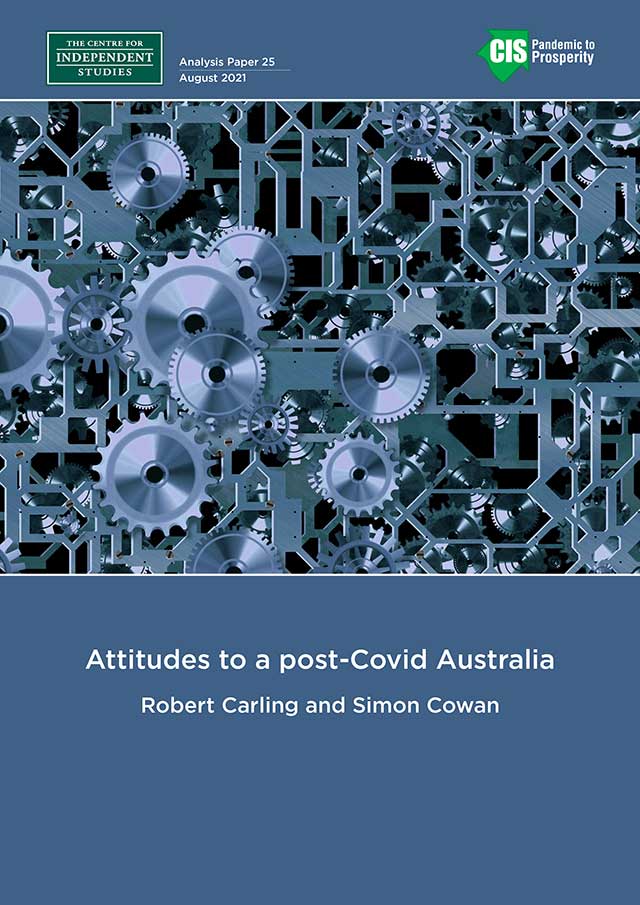By Robert Carling and Simon Cowan: Centre for Independent Studies.
In response to the emergence of the Delta variant, Australia’s experience of the coronavirus pandemic dramatically changed in June.
Sydney ultimately endured 106 days of continuous lockdown while Victoria floated in and out of lockdowns, with Melbourne taking the unenviable crown as the Most Locked Down City in the World.
Meanwhile, the rest of the country has remained on a knife’s edge.
It is time our politicians admitted that their authoritarian measures aren’t working. Much of the media has become a cheer squad for the blunt instrument of lockdowns and a moral hall monitor that polices thought crimes.
Now the debate has turned once again; with governments heralding new freedoms, that is the freedoms we once had, for the double vaccinated.
Polling commissioned by one of Australia’s leading conservative leaning thinktanks, the Centre for Independent Studies, suggests that Australians are unlikely to accept lockdowns once vaccination reaches high levels. COVID-Zero is not a viable policy.
This CIS conversation hosted by Tom Switzer features prominent Nine News political editor Chris Uhlmann as they discuss how Australia must move on from lockdowns and learn to live with COVID in society. Chris Uhlmann is political editor at Nine News and a regular contributor to the Sydney Morning Herald.
There are both reasons for optimism and reasons for pessimism in this paper. The poll suggests that Australians are unlikely to meekly accept ongoing lockdowns once vaccination reaches critical levels. Only a small minority believe we should continue to chase Covid Zero exclusively.
Moreover, few people are keen to stay in lockdown until everyone is vaccinated.
In part this reflects the belief, driven by experiences in Sydney and Melbourne in particular, that Covid is unlikely to be eradicated in Australia. Ultimately, the public accepts that we will need to live with Covid one way or another.
However, the responses are far less favourable when it turns to the issue of enforcement of penalties for breaching the health orders.
Almost 40% of respondents felt that the penalties were too low, and nearly 50% thought enforcement had been too lax. Only 14% felt the penalties were too high or too strict. This authoritarian streak of dobbing in our neighbours has been exploited by politicians to bolster support for their, at times draconian, policies.
Australians may have this idealised view of ourselves as larrikins who don’t follow the rules, but in reality we are a nation of ‘Karens’ tut-tutting over people not following ‘the rules’.
In a summary of the CIS findings, Attitudes to Covid restrictions, the authors observe:
One of the most pressing issues canvassed in the survey is when Covid restrictions should be lifted.
These include lockdowns of varying severity; compulsory QR check-ins; venue capacity restrictions; testing and tracing strategies; state border restrictions; and international border closures and quarantine requirements. Restrictions in all states have come, gone, and come back again in a now familiar cycle; but the intent of the survey question was to gauge the public’s views on when they should be lifted for good. It is only then that economic and social life can return to anything like normal.
Throughout the experience of the pandemic to date, it has often seemed that the Australian public has a high tolerance for restrictions if it means eliminating Covid-19. State border entry restrictions have generally been popular in the states imposing them.
The ‘go hard/go early’ mantra appears to be widely accepted as the recipe for lockdowns, especially since the arrival of the delta variant. The notion of Covid elimination (Covid Zero) has been put ahead of everything else including other health care and the economy.
However, the responses to the survey paint a more nuanced picture. 71% chose in roughly equal numbers to answer either “only when a vaccine threshold has been met” or “as soon as practicable” — the latter being a choice that draws out those most eager to see the end of restrictions, who comprised a substantial 37% of all respondents.
Q1. When should these restrictions be lifted?
As soon as practicable 37%
Only when a vaccine threshold has been met
34%
Not until Covid has been completely eliminated from Australia
13%
Some restrictions should continue even when the pandemic is over
13%
Don’t know 3%
These two options, chosen by a total of 71%, were most strongly favoured by NSW residents (77%), by higher income households (77%), by the most highly educated (77%), and by Coalition voters (78%).
There are no surprises there, but it is surprising that when dissected by age group the results showed the elderly (65+) to be most in favour (76%) and the youngest (18–24) least in favour (61%) but still in a majority.
Turning to the other options, only 13% chose “not until Covid has been completely eliminated from Australia” and an equal proportion went for the most demanding option, “some restrictions should continue even when the pandemic is over”.
The latter option was offered only because a recent UK survey had found more than 20% in favour of permanent restrictions. It is reassuring that the Australian result came in well below 20%, but still surprising that even 13% would favour permanent restrictions of the kind we have had, on and off, for the past 18 months.
These two options chosen by 26% in total found most favour among the youngest (35%); in WA (40%) and SA (37%); by lower income households (31%); those without tertiary qualifications (29%); and Labor and Greens voters (32%). The only surprise there is the result for the youngest. However, in all cases they were decisively outnumbered by the less demanding options. Surprisingly, the least support for these options among the states was in QLD (20%), where the state government usually puts Covid control ahead of all else.


